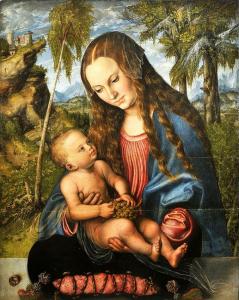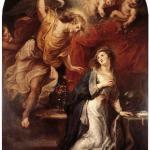Including a Listing of Many Biblical Passages About Sin, Holiness, Blamelessness, Righteousness, Godliness, Perfection, and Sanctity
Lots of people (and angels) have been without sin: if not always, at least for a time or season. Adam and Eve before they fell were sinless; had never sinned until they rebelled. If we consider all creatures, two-thirds of the angels are not only sinless now, but always have been so. Even Satan and the fallen angels were sinless before they rebelled. Some have argued (even some Protestants, I believe) that the prophet Jeremiah and/or John the Baptist may have possibly been sinless:
*
Jeremiah 1:5 (RSV) “Before I formed you in the womb I knew you, and before you were born I consecrated you; I appointed you a prophet to the nations.”*Luke 1:15 for he will be great before the Lord, . . . and he will be filled with the Holy Spirit, even from his mother’s womb. (cf. Mk 6:20: “John . . . was a righteous and holy man”)
*
Job is described by God as follows:
*
Job 1:8 And the LORD said to Satan, “Have you considered my servant Job, that there is none like him on the earth, a blameless and upright man, who fears God and turns away from evil?” (cf. 1:1; 2:3)
*
Moses wrote that Noah was “a righteous man, blameless in his generation; Noah walked with God” (Gen 6:9). The Bible states that “the heart of [King] Asa was blameless all his days” (2 Chr 15:17).
*
The word “blameless” appears forty times in the Old Testament in the RSV and twelve more times in the New. Zechariah and his wife Elizabeth, the parents of John the Baptist, are described in inspired revelation as “righteous before God, walking in all the commandments and ordinances of the Lord blameless” (Lk 1:5-6).
*
Children under the age of reason are basically sinless, as are those without the mental or intellectual capacity to make moral judgments. All of us are sinless every night when we sleep (excepting a wicked dream, which is only half-willing at best). After receiving absolution in sacramental confession, a person is sinless: at least until such time as he or she decides to sin again. All who make it to heaven will be sinless for all eternity.
*
St. Paul urges us to “be holy and blameless before him” (Eph 1:4). Sure, it’s an extremely high ideal or goal, but Paul acts as if it is at least potentially possible. He didn’t say (as Protestants would): “no one can ever possibly be blameless; so don’t even try; don’t even begin the attempt. It’s foolish to believe such a thing.”
*
No! Paul appears to believe that it can hypothetically be done, by God’s grace. Paul didn’t just say this once, but eight times: “that you . . . may be pure and blameless for the day of Christ” (Phil 1:10); “that you may be blameless and innocent, children of God without blemish” (Phil 2:15); “You are witnesses, and God also, how holy and righteous and blameless was our behavior” (1 Thess 2:10); “May the God of peace himself sanctify you wholly; and may your spirit and soul and body be kept sound and blameless at the coming of our Lord Jesus Christ” (1 Thess 5:23); “if they prove themselves blameless let them serve as deacons” (1 Tim 3:10); “a bishop, as God’s steward, must be blameless” (Titus 1:7; cf. 1:6).
*
See also passages about righteousness; for example: “put on the new nature, created after the likeness of God in true righteousness and holiness” (Eph 4:24); “aim at righteousness, godliness, faith, love, steadfastness, gentleness” (1 Tim 6:11; cf. 2 Tim 2:22); etc., and passages about being holy: for example, “For God’s temple is holy, and that temple you are” (1 Cor 3:17); “God’s chosen ones, holy and beloved” (Col 3:12); “who saved us and called us with a holy calling” (2 Tim 1:9), etc., and about holiness: for example, “in holiness and righteousness before him all the days of our life” (Lk 1:75); “let us cleanse ourselves from every defilement of body and spirit, and make holiness perfect in the fear of God” (2 Cor 7:1); “God has not called us for uncleanness, but in holiness” (1 Thess 4:7); “that we may share his holiness” (Heb 12:10); “Strive . . . for the holiness without which no one will see the Lord” (Heb 12:14); “what sort of persons ought you to be in lives of holiness and godliness” (2 Pet 3:11).
*
See also the passages about being godly; for example, “godly and respectful in every way” (1 Tim 2:2); “desire to live a godly life in Christ Jesus” (2 Tim 3:12); “live sober, upright, and godly lives” (Titus 2:12); and about godliness; for example, “Train yourself in godliness; . . . godliness is of value in every way, as it holds promise for the present life and also for the life to come” (1 Tim 4:7-8); “His divine power has granted to us all things that pertain to life and godliness” (2 Pet 1:3). We also have passages about being perfect; for example, “You, therefore, must be perfect, as your heavenly Father is perfect” (Mt 5:48); “If you would be perfect, go, sell what you possess” (Mt 19:21); “that you may be perfect and complete, lacking in nothing” (Jas 1:4);
*
We have also many scriptures about being sanctified; for example, “all those who are sanctified” (Acts 20:32); “those who are sanctified by faith in me” (Acts 26:18); “those sanctified in Christ Jesus” (1 Cor 1:2); “you were washed, you were sanctified” (1 Cor 6:11); “For this is the will of God, your sanctification” (1 Thess 4:3); “May the God of peace himself sanctify you wholly” (1 Thess 5:23); “saved, through sanctification by the Spirit and belief in the truth” (2 Thess 2:13); “those who are sanctified” (Heb 2:11); “chosen and destined by God the Father and sanctified by the Spirit” (1 Pet 1:2).
*
Lastly, we have many passages about sin itself; for example, “Sin no more” (Jn 5:14); “go, and do not sin again” (Jn 8:11); “Do not yield your members to sin as instruments of wickedness, but yield yourselves to God as men who have been brought from death to life, and your members to God as instruments of righteousness . . . sin will have no dominion over you” (Rom 6:13-14); “now that you have been set free from sin and have become slaves of God, the return you get is sanctification and its end, eternal life” (Rom 6:22); “Come to your right mind, and sin no more” (1 Cor 15:34); “whoever has suffered in the flesh has ceased from sin” (1 Pet 4:1); “if we walk in the light, . . . the blood of Jesus his Son cleanses us from all sin” (1 Jn 1:7); “I am writing this to you so that you may not sin” (1 Jn 2:1); “No one born of God commits sin; for God’s nature abides in him, and he cannot sin because he is born of God” (1 Jn 3:9); any one born of God does not sin” (1 Jn 5:18).
*
The Blessed Virgin Mary was sinless, due to an extraordinary, miraculous act of grace by God at her conception. We know this from the meaning of kecharitomene (“full of grace”): which is how the angel Gabriel described her in inspired revelation (Lk 1:28). I’ve constructed an argument for her sinlessness solely from Scripture, based on Luke 1:28 and its implications, in conjunction with Paul’s teaching on the antithetical nature of grace and sin.
*
Related Reading
*
The Bible: Mary Was Without Sin [4-1-09]
*
Sinless Mary: Dialogue w OT Professor (Dr. Jonathan Huddleston) [12-8-14]
*
“Armstrong vs. Geisler” #6: Sinless Mary [3-1-17]
*
*
Scripture, Through an Angel, Reveals That Mary Was Sinless [National Catholic Register, 4-30-17]
*
*
“All Have Sinned” vs. a Sinless, Immaculate Mary? [1996; revised and posted at National Catholic Register on 12-11-17]
*
Why Would a Sinless Mary Offer Sacrifices? (vs. Matt Slick) [10-29-20]
*
*
***
***
*
Practical Matters: Perhaps some of my 4,300+ free online articles (the most comprehensive “one-stop” Catholic apologetics site) or fifty-three books have helped you (by God’s grace) to decide to become Catholic or to return to the Church, or better understand some doctrines and why we believe them.
*
Or you may believe my work is worthy to support for the purpose of apologetics and evangelism in general. If so, please seriously consider a much-needed financial contribution. I’m always in need of more funds: especially monthly support. “The laborer is worthy of his wages” (1 Tim 5:18, NKJV). 1 December 2021 was my 20th anniversary as a full-time Catholic apologist, and February 2022 marked the 25th anniversary of my blog.
*
PayPal donations are the easiest: just send to my email address: [email protected]. You’ll see the term “Catholic Used Book Service”, which is my old side-business. To learn about the different methods of contributing, including 100% tax deduction, etc., see my page: About Catholic Apologist Dave Armstrong / Donation Information. Thanks a million from the bottom of my heart!
***
Photo credit: Lucas Cranach the Elder, Madonna under the fir tree (1509) [pubic domain / Wikimedia Commons]
***
Summary: I make a biblical argument about actual sinless creatures, and for potential sinlessness, based on many Bible passages commanding holiness, godliness, sanctity, etc.














